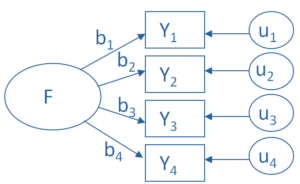One common reason for running Principal Component Analysis (PCA) or Factor Analysis (FA) is variable reduction.
In other words, you may start with a 10-item scale meant to measure something like Anxiety, which is difficult to accurately measure with a single question.
You could use all 10 items as individual variables in an analysis–perhaps as predictors in a regression model.
But you’d end up with a mess.
Not only would you have trouble interpreting all those coefficients, but you’re likely to have multicollinearity problems.
And most importantly, you’re not interested in the effect of each of those individual 10 items on your (more…)
by Maike Rahn, PhD
When are factor loadings not strong enough?
Once you run a factor analysis and think you have some usable results, it’s time to eliminate variables that are not “strong” enough. They are usually the ones with low factor loadings, although additional criteria should be considered before taking out a variable.
As a rule of thumb, your variable should have a rotated factor loading of at least |0.4| (meaning ≥ +.4 or ≤ –.4) onto one of the factors in order to be considered important. (more…)
Why use factor analysis?
Factor analysis is a useful tool for investigating variable relationships for complex concepts such as socioeconomic status, dietary patterns, or  psychological scales.
psychological scales.
It allows researchers to investigate concepts they cannot measure directly. It does this by using a large number of variables to esimate a few interpretable underlying factors.
What is a factor?
The key concept of factor analysis is that multiple observed variables have similar patterns of responses because they are all associated with a latent variable (i.e. not directly measured). (more…)
Factor is confusing much in the same way as hierarchical and beta, because it too has different meanings in different contexts. Factor might be a little worse, though, because its meanings are related.
In both meanings, a factor is a variable. But a factor has a completely different meaning and implications for use in two different contexts. (more…)

